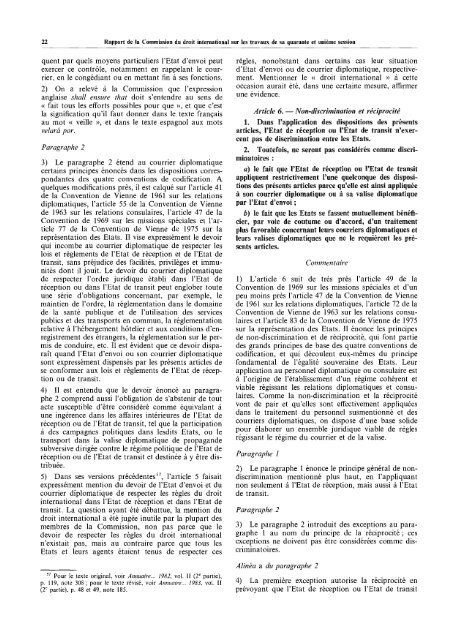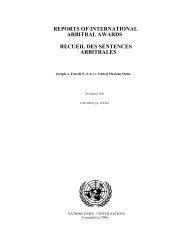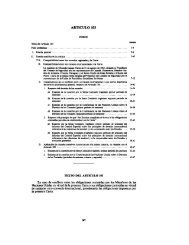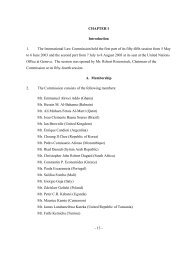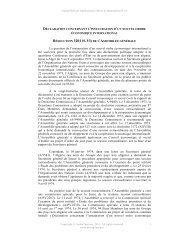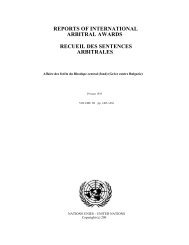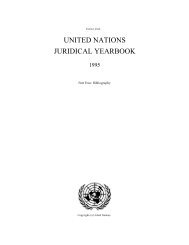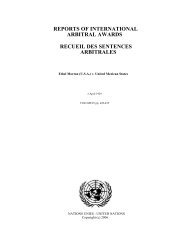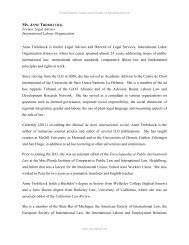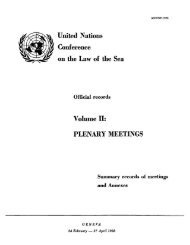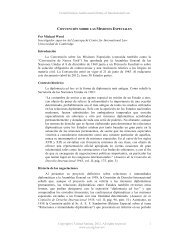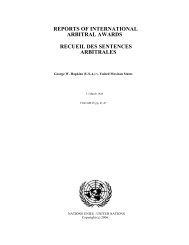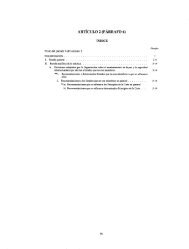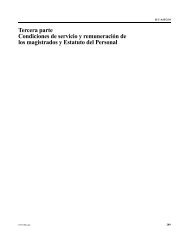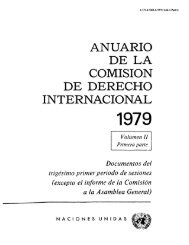projet d'articles sur le statut du courrier diplomatique et de la valse ...
projet d'articles sur le statut du courrier diplomatique et de la valse ...
projet d'articles sur le statut du courrier diplomatique et de la valse ...
You also want an ePaper? Increase the reach of your titles
YUMPU automatically turns print PDFs into web optimized ePapers that Google loves.
22 Rapport <strong>de</strong> <strong>la</strong> Commission <strong>du</strong> droit international <strong>sur</strong> <strong>le</strong>s travaux <strong>de</strong> sa quarante <strong>et</strong> unième session<br />
quent par quels moyens particuliers l'Etat d'envoi peut<br />
exercer ce contrô<strong>le</strong>, notamment en rappe<strong>la</strong>nt <strong>le</strong> <strong>courrier</strong>,<br />
en <strong>le</strong> congédiant ou en m<strong>et</strong>tant fin à ses fonctions.<br />
2) On a re<strong>le</strong>vé à <strong>la</strong> Commission que l'expression<br />
ang<strong>la</strong>ise shall en<strong>sur</strong>e that doit s'entendre au sens <strong>de</strong><br />
« fait tous <strong>le</strong>s efforts possib<strong>le</strong>s pour que », <strong>et</strong> que c'est<br />
<strong>la</strong> signification qu'il faut donner dans <strong>le</strong> texte français<br />
au mot « veil<strong>le</strong> », <strong>et</strong> dans <strong>le</strong> texte espagnol aux mots<br />
ve<strong>la</strong>râ por.<br />
Paragraphe 2<br />
3) Le paragraphe 2 étend au <strong>courrier</strong> <strong>diplomatique</strong><br />
certains principes énoncés dans <strong>le</strong>s dispositions correspondantes<br />
<strong>de</strong>s quatre conventions <strong>de</strong> codification. A<br />
quelques modifications près, il est calqué <strong>sur</strong> l'artic<strong>le</strong> 41<br />
<strong>de</strong> <strong>la</strong> Convention <strong>de</strong> Vienne <strong>de</strong> 1961 <strong>sur</strong> <strong>le</strong>s re<strong>la</strong>tions<br />
<strong>diplomatique</strong>s, l'artic<strong>le</strong> 55 <strong>de</strong> <strong>la</strong> Convention <strong>de</strong> Vienne<br />
<strong>de</strong> 1963 <strong>sur</strong> <strong>le</strong>s re<strong>la</strong>tions consu<strong>la</strong>ires, l'artic<strong>le</strong> 47 <strong>de</strong> <strong>la</strong><br />
Convention <strong>de</strong> 1969 <strong>sur</strong> <strong>le</strong>s missions spécia<strong>le</strong>s <strong>et</strong> l'artic<strong>le</strong><br />
77 <strong>de</strong> <strong>la</strong> Convention <strong>de</strong> Vienne <strong>de</strong> 1975 <strong>sur</strong> <strong>la</strong><br />
représentation <strong>de</strong>s Etats. Il vise expressément <strong>le</strong> <strong>de</strong>voir<br />
qui incombe au <strong>courrier</strong> <strong>diplomatique</strong> <strong>de</strong> respecter <strong>le</strong>s<br />
lois <strong>et</strong> règ<strong>le</strong>ments <strong>de</strong> l'Etat <strong>de</strong> réception <strong>et</strong> <strong>de</strong> l'Etat <strong>de</strong><br />
transit, sans préjudice <strong>de</strong>s facilités, privilèges <strong>et</strong> immunités<br />
dont il jouit. Le <strong>de</strong>voir <strong>du</strong> <strong>courrier</strong> <strong>diplomatique</strong><br />
<strong>de</strong> respecter l'ordre juridique établi dans l'Etat <strong>de</strong><br />
réception ou dans l'Etat <strong>de</strong> transit peut englober toute<br />
une série d'obligations concernant, par exemp<strong>le</strong>, <strong>le</strong><br />
maintien <strong>de</strong> l'ordre, <strong>la</strong> rég<strong>le</strong>mentation dans <strong>le</strong> domaine<br />
<strong>de</strong> <strong>la</strong> santé publique <strong>et</strong> <strong>de</strong> l'utilisation <strong>de</strong>s services<br />
publics <strong>et</strong> <strong>de</strong>s transports en commun, <strong>la</strong> rég<strong>le</strong>mentation<br />
re<strong>la</strong>tive à l'hébergement hôtelier <strong>et</strong> aux conditions d'enregistrement<br />
<strong>de</strong>s étrangers, <strong>la</strong> rég<strong>le</strong>mentation <strong>sur</strong> <strong>le</strong> permis<br />
<strong>de</strong> con<strong>du</strong>ire, <strong>et</strong>c. Il est évi<strong>de</strong>nt que ce <strong>de</strong>voir disparaît<br />
quand l'Etat d'envoi ou son <strong>courrier</strong> <strong>diplomatique</strong><br />
sont expressément dispensés par <strong>le</strong>s présents artic<strong>le</strong>s <strong>de</strong><br />
se conformer aux lois <strong>et</strong> règ<strong>le</strong>ments <strong>de</strong> l'Etat <strong>de</strong> réception<br />
ou <strong>de</strong> transit.<br />
4) II est enten<strong>du</strong> que <strong>le</strong> <strong>de</strong>voir énoncé au paragraphe<br />
2 comprend aussi l'obligation <strong>de</strong> s'abstenir <strong>de</strong> tout<br />
acte susceptib<strong>le</strong> d'être considéré comme équiva<strong>la</strong>nt à<br />
une ingérence dans <strong>le</strong>s affaires intérieures <strong>de</strong> l'Etat <strong>de</strong><br />
réception ou <strong>de</strong> l'Etat <strong>de</strong> transit, tel que <strong>la</strong> participation<br />
à <strong>de</strong>s campagnes politiques dans <strong>le</strong>sdits Etats, ou <strong>le</strong><br />
transport dans <strong>la</strong> valise <strong>diplomatique</strong> <strong>de</strong> propagan<strong>de</strong><br />
subversive dirigée contre <strong>le</strong> régime politique <strong>de</strong> l'Etat <strong>de</strong><br />
réception ou <strong>de</strong> l'Etat <strong>de</strong> transit <strong>et</strong> <strong>de</strong>stinée à y être distribuée.<br />
5) Dans ses versions précé<strong>de</strong>ntes 57 , l'artic<strong>le</strong> 5 faisait<br />
expressément mention <strong>du</strong> <strong>de</strong>voir <strong>de</strong> l'Etat d'envoi <strong>et</strong> <strong>du</strong><br />
<strong>courrier</strong> <strong>diplomatique</strong> <strong>de</strong> respecter <strong>le</strong>s règ<strong>le</strong>s <strong>du</strong> droit<br />
international dans l'Etat <strong>de</strong> réception <strong>et</strong> dans l'Etat <strong>de</strong><br />
transit. La question ayant été débattue, <strong>la</strong> mention <strong>du</strong><br />
droit international a été jugée inuti<strong>le</strong> par <strong>la</strong> plupart <strong>de</strong>s<br />
membres <strong>de</strong> <strong>la</strong> Commission, non pas parce que <strong>le</strong><br />
<strong>de</strong>voir <strong>de</strong> respecter <strong>le</strong>s règ<strong>le</strong>s <strong>du</strong> droit international<br />
n'existait pas, mais au contraire parce que tous <strong>le</strong>s<br />
Etats <strong>et</strong> <strong>le</strong>urs agents étaient tenus <strong>de</strong> respecter ces<br />
57 Pour <strong>le</strong> texte original, voir Annuaire... 1982, vol. II (2 e partie),<br />
p. 119, note 308 ; pour <strong>le</strong> texte révisé, voir Annuaire... 1983, vol. II<br />
(2 e partie), p. 48 <strong>et</strong> 49, note 185.<br />
règ<strong>le</strong>s, nonobstant dans certains cas <strong>le</strong>ur situation<br />
d'Etat d'envoi ou <strong>de</strong> <strong>courrier</strong> <strong>diplomatique</strong>, respectivement.<br />
Mentionner <strong>le</strong> « droit international » à c<strong>et</strong>te<br />
occasion aurait été, dans une certaine me<strong>sur</strong>e, affirmer<br />
une évi<strong>de</strong>nce.<br />
Artic<strong>le</strong> 6. — Non-discrimination <strong>et</strong> réciprocité<br />
1. Dans l'application <strong>de</strong>s dispositions <strong>de</strong>s présents<br />
artic<strong>le</strong>s, l'Etat <strong>de</strong> réception ou l'État <strong>de</strong> transit n'exercent<br />
pas <strong>de</strong> discrimination entre <strong>le</strong>s Etats.<br />
2. Toutefois, ne seront pas considérés comme discriminatoires<br />
:<br />
a) <strong>le</strong> fait que l'Etat <strong>de</strong> réception ou l'Etat <strong>de</strong> transit<br />
appliquent restrictivement l'une quelconque <strong>de</strong>s dispositions<br />
<strong>de</strong>s présents artic<strong>le</strong>s parce qu'el<strong>le</strong> est ainsi appliquée<br />
à son <strong>courrier</strong> <strong>diplomatique</strong> ou à sa valise <strong>diplomatique</strong><br />
par l'Etat d'envoi ;<br />
b) <strong>le</strong> fait que <strong>le</strong>s Etats se fassent mutuel<strong>le</strong>ment bénéficier,<br />
par voie <strong>de</strong> coutume ou d'accord, d'un traitement<br />
plus favorab<strong>le</strong> concernant <strong>le</strong>urs <strong>courrier</strong>s <strong>diplomatique</strong>s <strong>et</strong><br />
<strong>le</strong>urs valises <strong>diplomatique</strong>s que ne <strong>le</strong> requièrent <strong>le</strong>s présents<br />
artic<strong>le</strong>s.<br />
Commentaire<br />
1) L'artic<strong>le</strong> 6 suit <strong>de</strong> très près l'artic<strong>le</strong> 49 <strong>de</strong> <strong>la</strong><br />
Convention <strong>de</strong> 1969 <strong>sur</strong> <strong>le</strong>s missions spécia<strong>le</strong>s <strong>et</strong> d'un<br />
peu moins près l'artic<strong>le</strong> 47 <strong>de</strong> <strong>la</strong> Convention <strong>de</strong> Vienne<br />
<strong>de</strong> 1961 <strong>sur</strong> <strong>le</strong>s re<strong>la</strong>tions <strong>diplomatique</strong>s, l'artic<strong>le</strong> 72 <strong>de</strong> <strong>la</strong><br />
Convention <strong>de</strong> Vienne <strong>de</strong> 1963 <strong>sur</strong> <strong>le</strong>s re<strong>la</strong>tions consu<strong>la</strong>ires<br />
<strong>et</strong> l'artic<strong>le</strong> 83 <strong>de</strong> <strong>la</strong> Convention <strong>de</strong> Vienne <strong>de</strong> 1975<br />
<strong>sur</strong> <strong>la</strong> représentation <strong>de</strong>s Etats. Il énonce <strong>le</strong>s principes<br />
<strong>de</strong> non-discrimination <strong>et</strong> <strong>de</strong> réciprocité, qui font partie<br />
<strong>de</strong>s grands principes <strong>de</strong> base <strong>de</strong>s quatre conventions <strong>de</strong><br />
codification, <strong>et</strong> qui décou<strong>le</strong>nt eux-mêmes <strong>du</strong> principe<br />
fondamental <strong>de</strong> l'égalité souveraine <strong>de</strong>s Etats. Leur<br />
application au personnel <strong>diplomatique</strong> ou consu<strong>la</strong>ire est<br />
à l'origine <strong>de</strong> l'établissement d'un régime cohérent <strong>et</strong><br />
viab<strong>le</strong> régissant <strong>le</strong>s re<strong>la</strong>tions <strong>diplomatique</strong>s <strong>et</strong> consu<strong>la</strong>ires.<br />
Comme <strong>la</strong> non-discrimination <strong>et</strong> <strong>la</strong> réciprocité<br />
vont <strong>de</strong> pair <strong>et</strong> qu'el<strong>le</strong>s sont effectivement appliquées<br />
dans <strong>le</strong> traitement <strong>du</strong> personnel susmentionné <strong>et</strong> <strong>de</strong>s<br />
<strong>courrier</strong>s <strong>diplomatique</strong>s, on dispose d'une base soli<strong>de</strong><br />
pour é<strong>la</strong>borer un ensemb<strong>le</strong> juridique viab<strong>le</strong> <strong>de</strong> règ<strong>le</strong>s<br />
régissant <strong>le</strong> régime <strong>du</strong> <strong>courrier</strong> <strong>et</strong> <strong>de</strong> <strong>la</strong> valise.<br />
Paragraphe 1<br />
2) Le paragraphe 1 énonce <strong>le</strong> principe général <strong>de</strong> nondiscrimination<br />
mentionné plus haut, en l'appliquant<br />
non seu<strong>le</strong>ment à l'Etat <strong>de</strong> réception, mais aussi à l'Etat<br />
<strong>de</strong> transit.<br />
Paragraphe 2<br />
3) Le paragraphe 2 intro<strong>du</strong>it <strong>de</strong>s exceptions au paragraphe<br />
1 au nom <strong>du</strong> principe <strong>de</strong> <strong>la</strong> réciprocité ; ces<br />
exceptions ne doivent pas être considérées comme discriminatoires.<br />
Alinéa a <strong>du</strong> paragraphe 2<br />
4) La première exception autorise <strong>la</strong> réciprocité en<br />
prévoyant que l'Etat <strong>de</strong> réception ou l'Etat <strong>de</strong> transit


